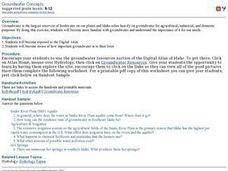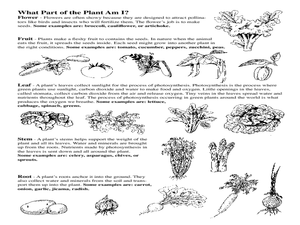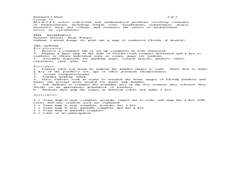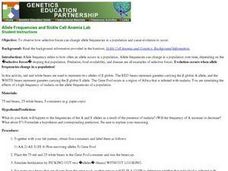Curated OER
Think Green
Students experience and practice compositing and recycling through hands-on-activities. They distinguish between which items from their trash can be recycled, composted and reused. The process for making recycled paper is also covered in...
Curated OER
The Compost Bucket
Students recognize that plants and soils have a close relationship. They view a photo essay on the common practice and natural process of composting. Afterwards, they observe the process of plant decay over the course of several days.
Curated OER
Groundwater Concepts
Students use a digital atlas and other electronic resources to explore freshwater reservoirs in Idaho. They discover the importance of groundwater and discuss the agricultural, industrial and domestic uses of underground reservoirs....
Curated OER
Proud To Be Latino
Students examine and research their Latino heritage. As a class, they read a poem and write their own individual poem about their pride in being Latino. To end the lesson, they read their poems to the class and discuss their various...
Curated OER
Trash Disposal Choices
Pupils investigate the use of landfills. In this landfill use and recycling lesson, students discuss what happens to trash and junk. They review the types of trash before categorizing a list of items they throw away each day. They...
Curated OER
Compost Tag
Students identify biodegradable items. In this environmental lesson, students participate in a game of tag. A student's name is called out along with a biodegradable item and the student is tossed a ball.
Curated OER
Vegetable Twister
Learners review vegetables and their nutrient values and production. In this vegetable production worksheet, students read information about the nutrients in vegetables and how they are grown. Learners participate in a game of Twister to...
Curated OER
Plant Party
Pupils identify plant parts. In this plants lesson, students bring in a vegetable. Each student classifies which part of the plant their vegetable comes from (flower, root, ect.) Pupils identify the parts of their vegetable and later...
Curated OER
Ocean Pollution
Young scholars study their role in eliminating ocean pollution and helping keep the oceans clean. In this environmental issues lesson, students define pollution and brainstorm examples of ocean pollution. Young scholars define...
Curated OER
Home on the Range
Students use maps and mathematics to determine the appropriate panther population in a given area. In this Florida ecology lesson, students research the area requirements of male and female panther and use a map to help calculate how...
Curated OER
Allele Frequencies and Sickle Cell Anemia Lab
Students investigate how selective forces like food, predation and diseases affect evolution. In this genetics instructional activity, students use red and white beans to simulate the effect of malaria on allele frequencies. They analyze...
Curated OER
Effects of organic material and nutrient pollution
Students create a definition of eutrophication. In this organic material lesson students work together to create a storyline.
Curated OER
Punnett Squares/Genetics
Ninth graders complete a monohybrid cross and a dihybrid cross. In this biology lesson, 9th graders predict the traits of offspring using the Punnett square. They differentiate recessive and dominant genes.
Curated OER
Are You Thirsty: The Effects of Pollution on Drinking Water
Students discuss the different causes of water pollution. In this ecology lesson, students brainstorm ways to purify polluted water. They formulate their conclusion based on the results of the experiments.
Other popular searches
- Fertilizer Chemistry
- Fertilizer Effect
- Fertilizer Rate Calculation
- Soil Fertilizer
- Irrigation and Fertilizer
- Chemical Fertilizer
- Fertilizer Lesson Plans
- Lawn Fertilizer
- Chemistry of Fertilizers
- Fertilizer Lesson Pl Ands
- Plants and Fertilizers
- Chemistry Fertilizers















